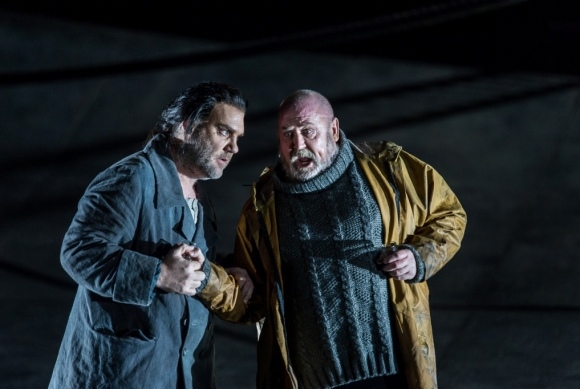Der fliegende Holländer (Royal Opera House)

© Clive Barda
Wagner’s tale of a cursed sea captain, doomed forever to sail the savage oceans unless he can find true love (tricky when you’re only allowed one day ashore every seven years), was a precursor to his other ‘holy burden’ projects, Der Ring des Nibelungen and Parsifal, and it shares those later works’ delight in the celestially-motivated quest. Structurally though, Der fliegende Holländer has more in common with the operas of German traditionalists like Weber than with his own later works.
Tim Albery‘s production gets off to a spine-tingling start through the simplest of means. During Wagner’s rousing overture the front drop billows and a distant light breaks through storm-grey murk. Curtain up, a young Steersman (the ubiquitous Ed Lyon, tireless on stage as in life as he alternates between this show and L’Ormindo) sings a haunting shanty and then falls asleep, whereupon a vast creeping shadow drowns the stage in blackness. In a single moment of stagecraft, astonishingly lit by David Finn, the Flying Dutchman’s ghost ship has moored.
Layered interpretations by almost everyone in the cast grip and convince. Lyon’s resoundingly-sung Steersman jumps from sulky to lairy; Peter Rose, in fine voice, makes Daland a shameless money-grubber as he all but throws his daughter at the dodgy Dutchman; even Erik, the poorly-delineated token tenor, is given three dimensions in Michael König‘s finely sung reading.
'the convincing and considered pacing of Andris Nelsons'
Then there’s Bryn Terfel, a Dutchman whose eternal hope, inextinguishable but only flickering, is so nearly rewarded before purgatory swallows him for good. Marvel as we may at that great bass-baritone voice, it’s Terfel's dramatic understanding that knocks you flat. However familiar we are with the opera’s outcome he still manages to let us believe that, for once, Der fliegende Holländer will reach a less desolate conclusion.
In this company only Adrianne Pieczonka disappoints. Her Senta is well sung and resonant, but she’s a character out of nowhere. Even her famous ballad just sits there, sounding lovely but with nothing going on behind the notes, and she leaves first König then Terfel high and dry during their intense duos.
On opening night the men of the Royal Opera Chorus fared better than the women, although that’s something that may settle down during the run. The sailors’ elaborate sea-shanty scene (a chorus of two crews) was properly hair-prickling, but Senta’s fellow sewing-machinists shared some cackly moments. As for the orchestra, Wagner’s engine room, the odd fluff aside its players responded like a newly-greased motor to the convincing and considered pacing of Andris Nelsons.
Albery's may be an anti-romantic staging, but that doesn’t make it sterile or lacking in entertainment value. On the contrary, there are felicities at every turn. My own favourite is Peter Rose’s byplay while Senta and the Dutchman embark on their uncomfortable dalliance. Like Polonius, he wants to leave them alone but he can’t bring himself to go. It’s beautifully done.










